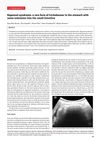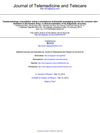 155 citations,
August 2003 in “Journal Of Experimental Zoology Part B: Molecular And Developmental Evolution”
155 citations,
August 2003 in “Journal Of Experimental Zoology Part B: Molecular And Developmental Evolution” Understanding hair growth involves complex interactions between molecules and could help treat hair disorders.
24 citations,
December 2018 in “Inflammation and Regeneration” Phospholipase A2 enzymes play key roles in skin health and disease.
 44 citations,
January 2005 in “Dermatology”
44 citations,
January 2005 in “Dermatology” Hair problems can be caused by genetics or the environment, and treatment should focus on the cause and reducing hair damage.
 January 2018 in “Open access journal of pharmaceutical research”
January 2018 in “Open access journal of pharmaceutical research” Biofield Energy Healing may increase hair growth by enhancing cell proliferation.
June 2024 in “Regenerative Therapy” iPSCs show promise for hair regeneration but need more research to improve reliability and effectiveness.
 3 citations,
May 2016 in “Gynecological Endocrinology”
3 citations,
May 2016 in “Gynecological Endocrinology” Low-dose flutamide improved hirsutism and satisfaction in women but had common side effects, causing some to stop treatment.
 77 citations,
March 2014 in “Cold Spring Harbor Perspectives in Medicine”
77 citations,
March 2014 in “Cold Spring Harbor Perspectives in Medicine” Fat cells are important for healthy skin, hair growth, and healing, and changes in these cells can affect skin conditions and aging.
 19 citations,
June 2015 in “Actas Dermo-Sifiliográficas”
19 citations,
June 2015 in “Actas Dermo-Sifiliográficas” Chronic kidney disease can cause skin problems that affect patient quality of life, and treating these conditions can improve outcomes.
 3 citations,
May 2018 in “European Journal of Dermatology”
3 citations,
May 2018 in “European Journal of Dermatology” Photodynamic therapy may not work for erythroplasia of Queyrat and could lead to invasive squamous cell carcinoma.
 August 2023 in “Skin Research and Technology”
August 2023 in “Skin Research and Technology” BLH308, with persimmon leaf, green tea, and sophora fruit extracts, safely increased hair density and thickness.
3 citations,
December 2023 in “Biomedicines” PRP therapy helps skin heal and improve by promoting cell growth and repair.
 January 2024 in “Cosmetics”
January 2024 in “Cosmetics” HAIR & SCALP COMPLEX may help treat hair loss by stimulating hair growth and restarting the hair cycle.
 28 citations,
January 2012 in “International Journal of Trichology”
28 citations,
January 2012 in “International Journal of Trichology” Genetics affect early female hair loss, severity depends on duration, and low ferritin levels not significant.
 3 citations,
November 2022 in “Frontiers in oncology”
3 citations,
November 2022 in “Frontiers in oncology” Low zinc levels may be linked to the return of gynecologic cancers.
 June 2023 in “International journal on recent and innovation trends in computing and communication”
June 2023 in “International journal on recent and innovation trends in computing and communication” Combining multiple algorithms predicts hair fall more accurately than using single algorithms.
 10 citations,
December 1996 in “Fertility and Sterility”
10 citations,
December 1996 in “Fertility and Sterility” Women with acne have lower levels of a specific hormone marker than women without acne.
 35 citations,
January 2014 in “BioMed Research International”
35 citations,
January 2014 in “BioMed Research International” Female pattern hair loss involves hormonal factors, genetics, and may be linked to low ferritin levels.
 6 citations,
January 2018 in “Acta dermatovenerologica Alpina, Pannonica et Adriatica (Tiskana izd.)”
6 citations,
January 2018 in “Acta dermatovenerologica Alpina, Pannonica et Adriatica (Tiskana izd.)” An 8-year-old girl with Rapunzel syndrome had a hairball removed from her stomach and intestines and recovered well after surgery.
 211 citations,
October 2001 in “The FASEB Journal”
211 citations,
October 2001 in “The FASEB Journal” Noggin is necessary to start the hair growth phase in skin after birth.
 October 2024 in “Biology”
October 2024 in “Biology” Dermal papilla cells can help regrow hair and are promising for hair loss treatments.
 28 citations,
February 2014 in “Journal of Telemedicine and Telecare”
28 citations,
February 2014 in “Journal of Telemedicine and Telecare” Smartphone-based teledermatology is effective for diagnosing skin diseases in the military with good accuracy.
 October 2023 in “Animal production science”
October 2023 in “Animal production science” Vitamin A deficiency changes cattle hair structure, while pregnancy may improve it, suggesting hair can indicate cattle health.
 28 citations,
January 2006 in “Journal of agricultural safety and health”
28 citations,
January 2006 in “Journal of agricultural safety and health” Most Latino farmworkers in the study had skin diseases, with fungal infections being the most common.
 13 citations,
May 2020 in “Journal of Cosmetic Dermatology”
13 citations,
May 2020 in “Journal of Cosmetic Dermatology” The article suggests using safety measures and telemedicine for aesthetic dermatology during COVID-19, while some procedures can still be done safely.
 20 citations,
September 1978 in “International Journal of Dermatology”
20 citations,
September 1978 in “International Journal of Dermatology” Hair growth is influenced by factors like genetics and nutrition, and more research is needed to understand hair loss and growth mechanisms.
 June 2021 in “Journal of emerging technologies and innovative research”
June 2021 in “Journal of emerging technologies and innovative research” Onion and Aloe vera can help protect hair from damage caused by hair dyes.
 September 2003 in “Clinics in Family Practice”
September 2003 in “Clinics in Family Practice” The document lists dermatology topics across life stages and notes hair loss can affect self-esteem and early skin cancer treatment is crucial.
 30 citations,
May 2004 in “Journal der Deutschen Dermatologischen Gesellschaft”
30 citations,
May 2004 in “Journal der Deutschen Dermatologischen Gesellschaft” The document concludes that early diagnosis and treatment are crucial for children with hair loss to prevent permanent damage, although not all conditions can be effectively treated.
 5 citations,
July 2020 in “Curēus”
5 citations,
July 2020 in “Curēus” Beard hair loss can signal early diabetes and thyroid issues, treatable with specific cream.
 38 citations,
April 2016 in “Experimental Dermatology”
38 citations,
April 2016 in “Experimental Dermatology” The document concludes that understanding hair follicle cell cycles is crucial for hair growth and alopecia research, and recommends specific techniques and future research directions.



























